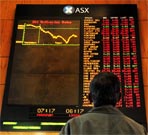Australia's Macquarie Bank falters despite share rally
 Sydney - The era of cheap debt that powered Macquarie Bank Ltd to becoming Australia's most admired and most profitable financial institution is over.
Sydney - The era of cheap debt that powered Macquarie Bank Ltd to becoming Australia's most admired and most profitable financial institution is over.
Shareholders were hoping Friday that a share-price rebound signalled it was not also game over for the nation's biggest home-grown investment bank.
There was hectic buying of a counter wallowing at a five-year low.
Those convinced that what Australians call the "millionaires factory" will survive the credit crunch, pointed to credit rating agency Moody's advice that liquid assets were "affording the group flexibility to ride out prolonged periods of wholesale funding market dislocations."
Macquarie, which owns toll roads, wind farms, airports and radio stations around the world, has delivered 16 consecutive years of bumper profits. It has pondered a bid on the London Stock Exchange and was thought at one time to be circling Qantas Airways Ltd.
But in the past year, as the sub-prime mortgage rout has undermined its business model, Macquarie shares have lost three quarters of their value.
On Thursday alone the stock tumbled 23 per cent, sparking talk that Macquarie would follow US-based investment bank Lehman Brothers into oblivion.
Macquarie, like other independent investment banks, can't raise money from depositors like the high street banks, and gets it cash from the global money markets. Investment banks can't easily pass on the cost of borrowing and so can get themselves marooned in a sea of debt.
Brian Johnson, banking analyst with JP Morgan in Sydney, spooked investors when he said the "direction of Macquarie's share price is telling us Macquarie is irrevocably broken."
His sentiment was echoed by David Murray, formerly chief of one of Australia's Big Four high street banks and now the head of the government's Future Fund. Murray said there would be a backlash against lax regulation and that lots of new capital adequacy rules would make business difficult for independents like Macquarie.
The allegation is that Macquarie's model only works when borrowing money is cheap and easy and when asset values look to be constantly on the rise. "Their cost of funds goes up and that puts pressure on margins obviously," said Roger Montgomery of Clime Asset Management. (dpa)